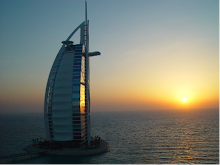Some business journalists are having a field day writing about SWFs -- they cheekily get the attention of readers by throwing in this abbreviation and then go on to explain that, no, they are not talking about Single While Females looking for dates. Rather, they are talking about Sovereign Wealth Funds.
Yes, the SWFs of the second type, especially from the Middle East, are on a strident march.
From the perspective of this blog, it is interesting to note that some of the biggest Sovereign Wealth Funds are based in what we are calling "The Other Middle East". The grand-daddy of SWFs is the one from Abu Dhabi, whose asset base is approaching $1 trillion.
In late 2007 and early 2008, Sovereign Wealth Funds pumped in money to buy stakes in Citigroup, Merrill Lynch, Morgan Stanley, and UBS. Nearly $60 billion flowed to troubled Wall Street banks, mostly from SWFs in the Middle East and Asia. Citigroup alone got a money injection of $7.5 billion investment from the Abu Dhabi Investment Authority, the world's richest sovereign fund.
Qatar is also on the move.
Qatar's state-controlled fund is accumulating shares in Credit Suisse. Qatar plans to spend $15 billion on European and U.S. bank stocks during 2008-2009.
With a population of less than 1 million, Qatar owns the world's third-biggest natural gas reserves and 1.3 percent of global crude oil-reserves, generating surpluses for investment by the investment authority. Qatar's state investment fund managed $60 billion in early 2008.
Sheikh Hamad bin Jasim bin Jaber al-Thani, Prime Minister of Qatar, also serves as the CEO of the Qatar Investment Authority. At a conference in Washington DC in February 2008, Sheikh Hamad also indicated some strategic diversification plans for Qatar Investment Authority. Qatar is creating funds of a $1 billion each in Finland and Malaysia, and Indonesia is next on the anvil. In this way, Qatar will have strong local access to investment opportunities in the EU and ASEAN.
Because of growing political concerns, especially in the United States where military and homeland security issues are often on front burners, officials from "the Other Middle East", such as Sheikh Hamad, seem to be on a diplomatic overdrive to reassure the U.S. that these investments are coming from Middle East countries that are friendly to the U.S., and that there are no intentions to grab control of strategic U.S. business entities. They also point out, quite rightly, that for decades U.S. firms have been investing in these countries.
Now, perhaps it is time for the SWFs to stalk the SWMs - Strapped Western Multinationals!
Nik Dholakia
Professor
University of Rhode Island
Subscribe to:
Post Comments (Atom)



No comments:
Post a Comment